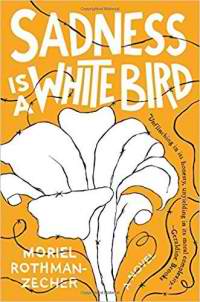
Published by Atria Books on February 13, 2018
As the title suggests, Sadness is a White Bird tells a sad story. It is a powerful story that addresses a young man’s moral dilemma when he is asked to give loyalty to one family (Israel) while disregarding his membership in a much larger family (humanity). The story’s power comes from the impossible situation its protagonist confronts when he is asked to choose between his best friends, who are clearly not his enemy, and the demands of the IDF, which insists that unarmed Palestinian protestors are dangerous enemies of Israel.
Transplanted from Pennsylvania to Israel, Jonathan considered himself a “discerning soldier” when he patrolled Palestinian villages with the IDF, trying not to adopt the bigoted mindset that characterized many of his fellow soldiers. Some of the soldiers with whom he patrols call him a “bleeding heart.” They belittle him for treating Palestinians decently and for trying to help his fellow soldiers understand their point of view. His missions are not always what he expected when he began his conscription, as when he helps quash a demonstration of dissenting Jews (with tear gas, as opposed to the bullets and grenades that are reserved for Palestinians).
As a teenager in Israel, Jonathan’s best friends were two Palestinians, Laith and his sister Nimreen, who had lived in Ohio and therefore shared with Jonathan the experience of living as young Americans. The story provides flashbacks to those times, narrated by Jonathan as he tells his story to an absent Laith. Jonathan predictably falls in love with Nimreen, and the scenes of their evolving intimacy and teenage desire are a bit sappy — the only weakness in a strong novel. From the tone of the letters and certain events in his past, however, it is not clear whether Jonathan has stronger feelings for Nimreen or for Laith. That question comes into focus later in the novel.
Jonathan’s flashbacks also educate the reader about Jonathan’s experiences with anti-Semitism and childhood bullying in Pennsylvania, and his training in the Israeli paratroopers, which the bullying may have motivated. The flashbacks also provide insight into the family background of Laith and Nimreen, and of a visit Jonathan made to his grandfather in Greece. The novel’s power is rooted in the oppression that each family has endured.
That power gains full force in the present, when Jonathan’s service in the IDF showcases his conflict between his loyalty to the soldiers with whom he serves and his belief that Palestinians have cause to protest Israel’s resistance to their call for freedom. Not surprisingly, before he is drafted, conflict arises between Nimreen and Jonathan because he will not join draft resisters who refuse to help Israel oppress Palestinians. Returning to the United States would be an easy way to resolve the dilemma, but Jonathan struggles to understand whether that would be an honorable solution. Jonathan is young and he craves the approval of his family (both his immediate relatives and the larger family of Jewish Israelis), not just Nimreen’s.
The novel points to the ways in which people are the same (which are fundamental) and the ways in which they are different (which are shaped by history and experience). The story suggests that understanding individual and cultural differences without losing sight of our commonality is the key to overcoming the hostility and violence that are bred by fears and prejudices and by honest differences of political opinion.
At the same time, the novel tests the adage “love conquers all.” It is possible for Jonathan and Nimreen to love each other, but can that love survive when Jonathan joins the IDF? The novel doesn’t back away from the question or answer it with a Pollyannaish view of love.
The story builds toward a dramatic moment that might turn friend against friend, but it builds drama upon a foundation of honesty rather than melodrama. The reader expects that moment to arrive, but the story’s climax is no less powerful for that. It is easy to admire Jonathan’s courage when he stands up to IDF propaganda and insists that the truth about the dramatic moment be known, despite the government’s attempt to fix blame on Palestinians for Jonathan’s misstep and to shelter the IDF from well-deserved criticism. At the same time, it is easy to sympathize with Jonathan, a young man who has no desire to be courageous or to make moral choices, who just wants his life to return to a simpler time when love and friendship were not imperiled by political conflict. Readers who appreciate novels that opt for a realistic portrayal of difficult struggles rather than a simplistic "we're good, they're bad" perspective will find much to admire in Sadness Is a White Bird.
RECOMMENDED